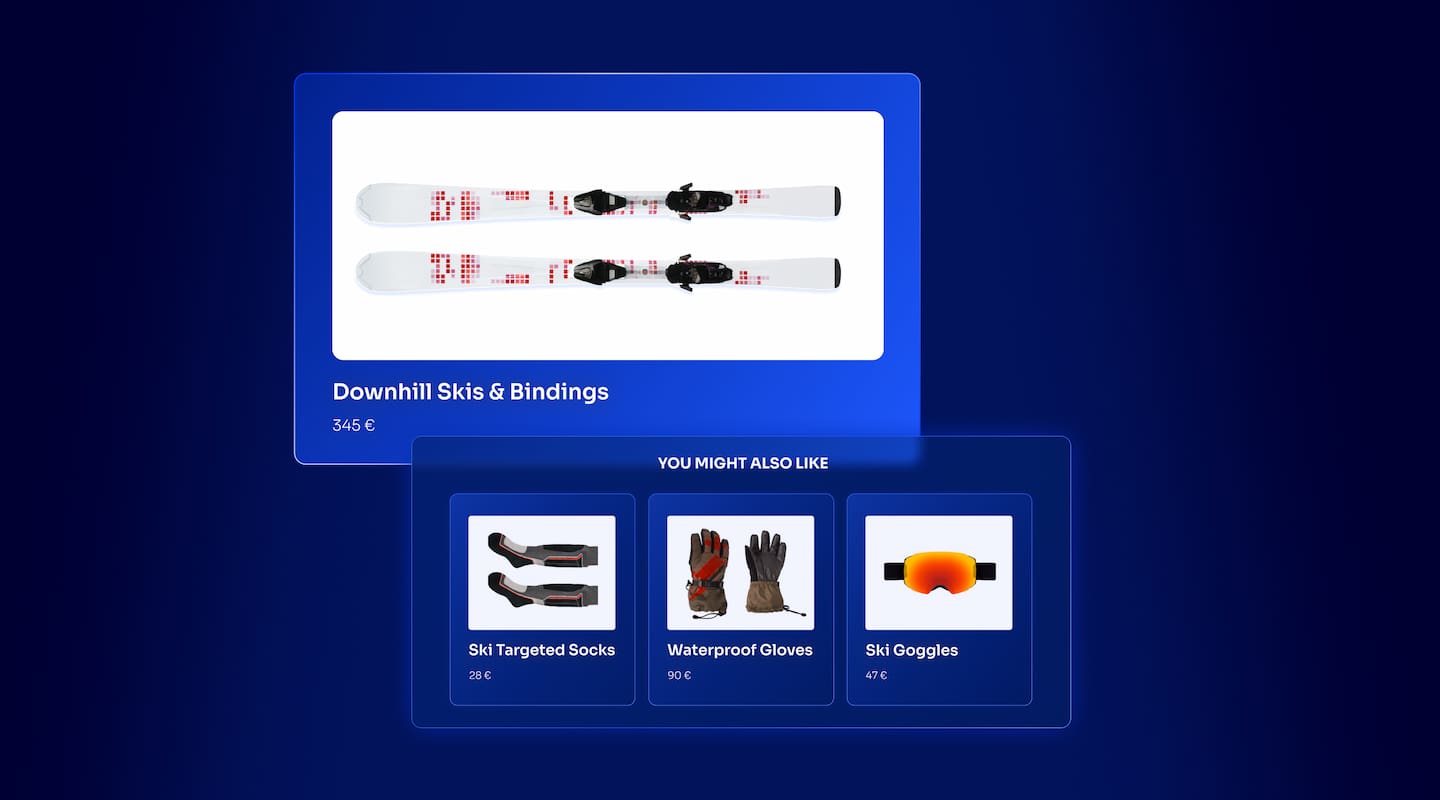Add InstantSearch and Autocomplete to your search experience in just 5 minutes
A good starting point for building a comprehensive search experience is a straightforward app template. When crafting your application’s ...
Senior Product Manager


A good starting point for building a comprehensive search experience is a straightforward app template. When crafting your application’s ...
Senior Product Manager

The inviting ecommerce website template that balances bright colors with plenty of white space. The stylized fonts for the headers ...
Search and Discovery writer

Imagine an online shopping experience designed to reflect your unique consumer needs and preferences — a digital world shaped completely around ...
Senior Digital Marketing Manager, SEO

Winter is here for those in the northern hemisphere, with thoughts drifting toward cozy blankets and mulled wine. But before ...
Sr. Developer Relations Engineer

What if there were a way to persuade shoppers who find your ecommerce site, ultimately making it to a product ...
Senior Digital Marketing Manager, SEO

This year a bunch of our engineers from our Sydney office attended GopherCon AU at University of Technology, Sydney, in ...
David Howden &
James Kozianski

Second only to personalization, conversational commerce has been a hot topic of conversation (pun intended) amongst retailers for the better ...
Principal, Klein4Retail

Algolia’s Recommend complements site search and discovery. As customers browse or search your site, dynamic recommendations encourage customers to ...
Frontend Engineer

Winter is coming, along with a bunch of houseguests. You want to replace your battered old sofa — after all, the ...
Search and Discovery writer

Search is a very complex problem Search is a complex problem that is hard to customize to a particular use ...
Co-founder & former CTO at Algolia

2%. That’s the average conversion rate for an online store. Unless you’re performing at Amazon’s promoted products ...
Senior Digital Marketing Manager, SEO

What’s a vector database? And how different is it than a regular-old traditional relational database? If you’re ...
Search and Discovery writer

How do you measure the success of a new feature? How do you test the impact? There are different ways ...
Senior Software Engineer

Algolia's advanced search capabilities pair seamlessly with iOS or Android Apps when using FlutterFlow. App development and search design ...
Sr. Developer Relations Engineer

In the midst of the Black Friday shopping frenzy, Algolia soared to new heights, setting new records and delivering an ...
Chief Executive Officer and Board Member at Algolia

When was your last online shopping trip, and how did it go? For consumers, it’s becoming arguably tougher to ...
Senior Digital Marketing Manager, SEO

Have you put your blood, sweat, and tears into perfecting your online store, only to see your conversion rates stuck ...
Senior Digital Marketing Manager, SEO

“Hello, how can I help you today?” This has to be the most tired, but nevertheless tried-and-true ...
Search and Discovery writer
Can you take a hint? How about an autocomplete suggestion in a search box?
More to the point, if you’re a retailer or online media content provider, can you effectively provide autosuggest for your search-box users?
You’ve probably noticed the autocomplete feature when you type in a Google search term or use other high-profile search engines such as Bing. Search box technology seems to be getting better at anticipating human needs. The autosuggest feature seems to be thinking about what you might want, and maybe your request aligns with popular searches done by other people. You enter a few letters (or even just one) in the search field on a company’s homepage and it feels like you’re playing charades: the search engine starts guessing.
Wondering what the difference is between auto suggest (or autosuggest) and autocomplete functionality? You’re not alone; it’s easy to confuse them, and people often refer to them interchangeably, along with other terms including typeahead and predictive search.
But if we’re going to get technical, auto suggest is a broad concept that encompasses predicting search user queries and providing query suggestions based on partially entered search terms, usually in a text box below the search field.
Autocomplete is in essence a subset of autosuggest; it automatically finishes words and phrases as a user types, rather than offering suggestions.
Of course, autosuggest is more than a parlor game punctuated by frenzied guesswork. Search algorithms are expertly designed based on vast amounts of user data so that they can “intelligently” anticipate users’ thoughts.
Regardless of the fine points, these days, if you have a searchable web site or app and want to get or stay ahead of your competition, providing your users with auto-suggest functionality is a must.
When it comes to implementing autosuggest, which search features will keep your audience engaged and help them find their desired content fast? Here are some best practices for designing the right experience:
Since the dot-com bubble of the 1990s, the amount of available digital content has exploded; even a single ecommerce site may contain hundreds of web pages. Wading through the quagmire of content isn’t an option for users — they must be able to instantly narrow their searches or they’ll waste time and never get anywhere.
This is where scoping comes in. Scoping helps your users customize and narrow their search queries before the search engine starts searching.
Scope “tags,” which categorize search queries by type, point users to the right section of a website. A good example is the tags for Google’s search engine, which initially narrows the search results page by categories such as image, video, and news.
Useful for: Sites and apps offering a wealth of content that can be sorted by type
Example: Amazon, which scopes its products as categories such as book, film, household, clothing.
With 76% of consumers shopping using mobile devices’ tiny keyboards, offering excellent mobile-friendly search can make a huge difference in their shopping success rates.
Useful for: A site or app that has a large base of mobile users (e.g., Apple Maps)
Example: Gmail autocomplete
Studies show that people prefer fewer options to more choices; beyond a certain number of choices, they become overwhelmed. If a user is overwhelmed by an overabundance of options, it may well lead to “action paralysis” — the inability to make a choice.
What does that mean for search on your site? Simply put, too much user search choice will kill your conversion.
Advanced search that keeps things pared down can help your users make choices and move forward. Advanced search is an extension of scoping, with more filters for users to select. It lets searchers so they can quickly navigate to a more-specific search result, which is especially useful when search results are extensive.
Useful for: A site or app that supplies large quantities of content
Example: Rightmove
Don’t recall what you did yesterday? There’s still hope: your search engine might be able to help you refresh your memory.
Recent search history helps your users who may have gotten busy or distracted recall their searching activity and resume where they left off with the aim of getting them quickly to a search result the second time.
Useful for: Any website or app, especially those with a longer decision-making journey for the user, such as one that involves expensive purchases)
Example: Walmart, which displays a drop-down list of recent searches in the search bar
This usability-improvement technique builds on the idea of scoping and advanced search. Instead of requiring endless up and down scrolling by users, short suggestion lists cull autocomplete search suggestions, displaying only the most relevant and timely (according to factors like what’s trending for other users).
Useful for: Making search suggestion lists more palatable
Example: Google, which limits the number of suggestion to 10
Voice search works through automatic speech recognition (ARS), translating spoken suggestions into text search. Is speaking ever going to replace typing? Perhaps. Voice search for websites and apps is certainly on the rise, particularly in ecommerce. And it’s especially handy for smart-device users who want to be able to search hands free.
Useful for: Folks on the go
Example: Google Maps
Effective autosuggest functionality provides the right search experience to engage users during their discovery, consideration, or conversion phase (or all three).
Want to know more about autosuggest and start using this technology to enhance your site-search user experience? The world’s leading businesses trust Algolia’s search API to provide search optimization that delights their users and improves their bottom line. Get started free today!
Powered by Algolia Recommend